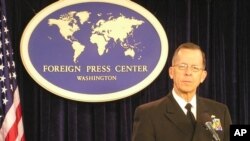U.S. Admiral Mike Mullen, Chairman of the Joint Chiefs of Staff, speaking to reporters about security strategy in Asia recently from Washington, said that "given the great significance of the Asia Pacific region to global security and prosperity," the time is now to try to make the military to military relationship work with China.
"There are still very real, very substantive issues between [the United States and China]. . . We have a long way to go in our relationship," Admiral Mullen said. "[But] we’re off to a good start. I [am] encouraged that we now have . . . a basis for ongoing dialogue and . . . common challenges we can . . . work on together – like piracy, terrorism, and disaster relief operations."
"As important as developing this military relationship with China is to our interests, we cannot let it dominate our thinking, planning, and force posture decisions," Admiral Mullen said. "We have other vital and enduring security commitments in the region that we must also deepen and broaden."
"The Republic of Korea . . . has been steadfast in supporting United States security efforts around the world, and our commitment to their defense and to security on the Peninsula remains unwavering," Admiral Mullen said. "It is my view that the North Korean regime will once again attempt to provoke hostilities . . . Thus far, [South Korean] leaders have shown commendable restraint, but I think it would be a grave mistake for [North Korea] to perceive this restraint as a lack of resolve, or . . . capability of our alliance to defend itself."
"We take seriously our commitment to the defense of Japan and will continue to work with the Japanese self defense forces to improve their out-of-area operational capabilities," Admiral Mullen continued. "We aim to strengthen other partnerships as well. Our alliance with Australia represents a model for interoperability, transparency, and . . . full spectrum capabilities. We seek expanded military cooperation . . . with India on nonproliferation, safeguarding the global commons, and countering terrorism. We will expand our military security cooperation . . . with the Philippines, Thailand, Vietnam, Malaysia, Pakistan, Indonesia, Singapore, and other states in the region, working with them to address common threats to their sovereignty and security."
Admiral Mullen concluded that multilateral relationships improve understanding, sharpen interoperability, strengthen regional norms, and encourage more responsibility by more people in addressing shared security challenges.
Security Strategy In Asia

The U.S. calls for an ongoing military relationship with China, given the significance of the Asia Pacific region to global security.



